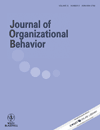
Organizational Psychology Review
Scope & Guideline
Shaping the future of organizational practices through research.
Introduction
Aims and Scopes
- Interpersonal Dynamics in Organizations:
Research on leader-member exchanges, team dynamics, and the relational aspects of workplace interactions, exploring how these relationships influence motivation, performance, and well-being. - Workplace Justice and Ethics:
Investigations into justice theory and its applications in organizational contexts, addressing issues related to fairness, equity, and ethical decision-making in workplace settings. - Team Processes and Effectiveness:
Studies focusing on team dynamics, including collaboration, communication, and the impact of diversity on team performance and innovation. - Sustainability and Social Responsibility:
Exploration of organizational practices related to sustainability and corporate social responsibility, emphasizing the role of psychology in promoting proactive behaviors and organizational change. - Methodological Advances in Organizational Research:
Development and application of innovative research methodologies, including meta-analyses, systematic reviews, and experimental designs to enhance the rigor and relevance of organizational psychology research.
Trending and Emerging
- Interdisciplinary Approaches to Organizational Issues:
The integration of insights from various disciplines, such as behavioral science, technology, and sociology, is gaining traction, as researchers seek to address complex organizational challenges through a multifaceted lens. - Digital Work and Technology Impact:
An increasing focus on how digital environments and technological advancements affect workplace dynamics, employee well-being, and organizational effectiveness, highlighting the need for new frameworks to understand these changes. - Health and Well-being in the Workplace:
A growing emphasis on mental health, well-being, and resilience among employees, exploring interventions and practices that support psychological health in organizational settings. - Diversity and Inclusion Practices:
Research on diversity and inclusion is trending, with increased attention to the psychological implications of diverse workforces and the development of inclusive organizational cultures. - Sustainability and Organizational Change:
Emerging themes around sustainability practices and their psychological foundations are becoming prominent, reflecting a shift towards understanding how organizations can implement sustainable practices effectively.
Declining or Waning
- Traditional Motivation Theories:
Research centered on classical motivation theories, such as Maslow's hierarchy or Herzberg's two-factor theory, appears to be less frequent, possibly due to the emergence of more nuanced frameworks like self-determination theory and contemporary understandings of motivation. - Static Job Design:
Studies focusing on fixed job roles and traditional job design have diminished, as contemporary research increasingly emphasizes agile work structures, role fluidity, and the dynamic nature of work environments. - Individualistic Approaches to Leadership:
The focus on individual-centric leadership styles, such as trait-based leadership, has waned, giving way to more relational and collective approaches that consider the influence of context and team dynamics. - Descriptive Studies without Practical Application:
There is a decline in purely descriptive studies that lack a practical or theoretical contribution to organizational practice, as the journal increasingly prioritizes research that offers actionable insights and implications.
Similar Journals

Industrial and Organizational Psychology-Perspectives on Science and Practice
Empowering Research to Transform Organizational PracticesIndustrial and Organizational Psychology: Perspectives on Science and Practice is a renowned academic journal published by Cambridge University Press, dedicated to the fields of Industrial and Organizational Psychology. With its ISSN: 1754-9426 and E-ISSN: 1754-9434, the journal has established itself as a vital resource for researchers, practitioners, and students alike. Covering an extensive range of topics within the discipline, it aims to bridge the gap between theory and practice by presenting empirical research, methodological innovations, and applicable insights into the workplace environment. As of 2023, it ranks in the second quartile (Q2) for both Applied Psychology and Social Psychology, showcasing its significance within these fields. With impressive Scopus rankings—#34 out of 310 in Social Psychology and #47 out of 249 in Applied Psychology—the journal serves as a prestigious platform for cutting-edge research that influences practice and policy in organizational settings. Although it does not currently offer open access, the journal is committed to advancing the discipline from its headquarters in Cambridge, UK, making it an essential reading for anyone interested in the latest developments and findings in industrial and organizational psychology.

Organizatsionnaya Psikologiya
Empowering Scholars in Organizational PsychologyOrganizatsionnaya Psikologiya is a pivotal academic journal published by the NATIONAL RESEARCH UNIVERSITY HIGHER SCHOOL OF ECONOMICS in the Russian Federation, dedicated to advancing the field of applied psychology, organizational behavior, and social psychology. With an ISSN of 2312-5942, this journal serves as a platform for innovative research and discourse, particularly within its scope encompassing organizational contexts and human resource management. Despite currently being classified in the Q4 quartile across its relevant categories as of 2023, it remains committed to fostering impactful scholarship that contributes to the theoretical and practical facets of psychology. Access options are not explicitly available, emphasizing the need for institutional affiliations to obtain published works. Organizatsionnaya Psikologiya aims to cultivate an engaging community of researchers, practitioners, and students, providing valuable insights that can facilitate real-world applications and enrich academic debates in the field.

European Journal of Work and Organizational Psychology
Exploring the intersection of psychology and organizational behavior.The European Journal of Work and Organizational Psychology, published by Routledge Journals, Taylor & Francis Ltd, stands at the forefront of research in the fields of Applied Psychology and Organizational Behavior. With a prestigious Q1 ranking in both categories as of 2023, this journal is highly regarded among scholars and practitioners alike for its rigorous, peer-reviewed articles that address critical issues within the workplace and organizational settings. Established in 2005, it continues to be a vital platform for disseminating innovative research and theories that influence contemporary practices in human resource management and organizational psychology. Although it does not operate under an open access model, its visibility and accessibility through various academic databases ensure significant engagement from its target audience. By fostering a deeper understanding of work dynamics, the journal underscores its commitment to elevating the dialogue about employee well-being, productivity, and organizational effectiveness, making it an essential resource for anyone invested in the future of work.

JOURNAL OF ORGANIZATIONAL BEHAVIOR
Unveiling innovative insights for organizational success.JOURNAL OF ORGANIZATIONAL BEHAVIOR, published by Wiley in the United Kingdom, is a premier academic journal dedicated to advancing the field of organizational behavior and related disciplines. With an impressive impact factor and positioned in the Q1 quartile across multiple categories including Applied Psychology, Organizational Behavior and Human Resource Management, and Sociology, this journal stands as an essential resource for researchers, practitioners, and students alike. Since its inception in 1981, it has consistently provided a platform for innovative research that explores the dynamics of organizational practices, employee behavior, and workforce management strategies. Although it is not an open access journal, it remains accessible through various academic platforms, ensuring that impactful studies contribute to the ongoing dialogues within the social sciences. The JOURNAL OF ORGANIZATIONAL BEHAVIOR is not only a reflection of the current trends and challenges faced within organizations but also a beacon guiding future research and practical applications in enhancing organizational effectiveness.

APPLIED PSYCHOLOGY-AN INTERNATIONAL REVIEW-PSYCHOLOGIE APPLIQUEE-REVUE INTERNATIONALE
Championing Excellence in Applied Psychology Scholarship.Applied Psychology - An International Review, published by Wiley, is a prestigious journal that has been a cornerstone of scholarship in the field of psychology since its inception in 1955. With an ISSN of 0269-994X and an E-ISSN of 1464-0597, this journal has established itself as a leading resource for applied psychological research, reflecting high standards of academic rigor and relevance. Currently holding a Q1 ranking in Applied Psychology, Arts and Humanities (miscellaneous), and Developmental and Educational Psychology, this journal ranks among the top in its fields, boasting impressive Scopus rankings that place it in the 95th percentile or higher across various categories. While the journal does not offer Open Access options, it continues to be a vital resource for researchers, professionals, and students seeking to apply psychological principles to real-world issues. The scope of the journal encompasses a wide array of topics, including developmental and educational psychology, thereby promoting interdisciplinary collaboration and the dissemination of innovative research. For those committed to advancing knowledge in applied psychology, Applied Psychology - An International Review remains an essential publication, fostering a deeper understanding of psychological practices in diverse contexts.

Team Performance Management
Innovating Strategies for Team SuccessTeam Performance Management is a prestigious academic journal published by Emerald Group Publishing Ltd, focusing on the critical fields of Management Information Systems, Management of Technology and Innovation, and Organizational Behavior and Human Resource Management. With an ISSN of 1352-7592 and E-ISSN 1758-6860, this journal has been serving the academic community since its inception in 1995, and continues to be an invaluable resource for researchers and practitioners through 2024. Residing in the United Kingdom, it boasts a commendable Q2 ranking in 2023 within Management Information Systems and Q3 rankings in both Management of Technology and Innovation, and Organizational Behavior and Human Resource Management, reflecting its significance in the respective categories. The journal emphasizes rigorous research that enhances understanding of team dynamics and collective performance, making it an essential platform for those dedicated to advancing knowledge and practices in team management. Although it does not offer open access, its contributions are pivotal for professionals seeking to enhance team efficacy, motivating a diverse readership of researchers, students, and industry leaders.

JOURNAL OF BUSINESS AND PSYCHOLOGY
Exploring the dynamics of human behavior in organizational settings.JOURNAL OF BUSINESS AND PSYCHOLOGY is a premier academic journal published by Springer, dedicated to advancing the fields of applied psychology and business management. With an ISSN of 0889-3268 and an E-ISSN of 1573-353X, this journal has been at the forefront of interdisciplinary research since its inception in 1986 and continues to serve as a vital resource for researchers, professionals, and students alike. The journal is currently recognized as a Q1 journal in several categories, including Applied Psychology, Business and International Management, and general categories within Psychology and Business, Management and Accounting, further asserting its significant impact and relevance in the academic community. It boasts top rankings in Scopus, maintaining prestigious positions that reflect its commitment to quality and innovation in research, including an impressive percentile rank of 91st in General Psychology. Despite not being an open access journal, JOURNAL OF BUSINESS AND PSYCHOLOGY provides invaluable insights that shape contemporary understandings of psychological principles in business contexts, making it essential reading for those interested in the convergence of insights in both fields.

HUMAN RESOURCE MANAGEMENT
Exploring Innovative Strategies for Organizational SuccessHUMAN RESOURCE MANAGEMENT, published by Wiley Periodicals, Inc, is a leading academic journal that has been at the forefront of research in the fields of Applied Psychology, Organizational Behavior, and Human Resource Management since its inception in 1961. With a remarkable impact factor and consistently rated in the Q1 quartile across multiple categories, it is recognized for its rigorous peer-reviewed articles that provide significant insights into the management of human resources and organizational effectiveness. This journal has earned a prestigious standing, ranking #13 in Organizational Behavior and Human Resource Management, and #20 in Applied Psychology according to Scopus metrics, placing it in the top percentiles of its field. Although it does not currently offer Open Access options, HUMAN RESOURCE MANAGEMENT remains a vital resource for researchers, professionals, and students eager to explore innovative strategies and practices within the ever-evolving landscape of human resource management. Its commitment to advancing scholarly dialogue and practical applications makes it an essential tool for those looking to stay at the cutting edge of this dynamic discipline.

Gedrag & Organisatie
Unveiling Emerging Theories in Human Resource ManagementGedrag & Organisatie, published by UITGEVERIJ LEMMA B V in the Netherlands, serves as a vital platform for scholars and practitioners in the fields of Organizational Behavior, Human Resource Management, and Social Psychology. With an ISSN of 0921-5077 and an E-ISSN of 1875-7235, this journal aims to foster scholarly dialogue and research dissemination from 2008 to 2024. Despite its current standing in the Q4 category across various rankings, including Organizational Behavior and Human Resource Management and Social Psychology, Gedrag & Organisatie plays a crucial role in introducing emerging theories and practical insights that can influence organizational practices and social dynamics. Researchers and students interested in the intersection of human behavior and management strategies will find the journal a rich resource for understanding contemporary challenges and advancements in these domains. The journal does not currently offer Open Access options, making it pivotal for institutions and individuals focused on subscription-based research access.

Journal of Work and Organizational Psychology-Revista de Psicologia del Trabajo y de las Organizaciones
Advancing insights into the dynamics of work and organizations.The Journal of Work and Organizational Psychology (Revista de Psicologia del Trabajo y de las Organizaciones) is a leading open access journal dedicated to advancing research and practice in the fields of organizational behavior, human resource management, and social psychology. Published by the COLEGIO OFICIAL PSICOLOGOS MADRID, this esteemed journal has been contributing to the scientific community since 1985. Its commitment to rigorous peer-reviewed research is underscored by its impressive Scopus rankings; it holds a rank of #82 out of 310 in Social Psychology and #75 out of 230 in Organizational Behavior, positioning it in the top quartile of its category as of 2023. Operating from Madrid, Spain, and boasting an H-index that reflects its influence in the academic sphere, the journal encourages submissions that foster innovative insights and practical applications within the workplace setting. Researchers, practitioners, and students are invited to explore and contribute to this vital resource that shapes understanding and strategies in today's dynamic organizational landscapes.